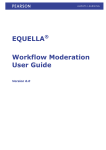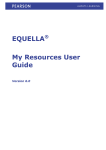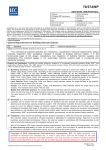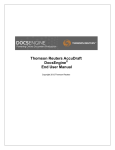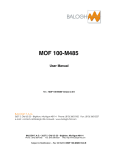Download UTS Policy Framework: user guide
Transcript
UTS Policy Framework: user guide Contents 1. Introduction 1 2. The role of policy within the University 1 3. Summary of document categories and approval pathways 1 4. Key policy management roles within the University 3 5. Writing policy 3 6. Flow chart of the development and review process 3 7. Development and review process commentary 6 8. Acknowledgements and feedback 8 Templates Policy template 64kb Word Directive template 64kb Word Coversheets Coversheet — policies 48kb Word Coversheet — academic policies 48kb Word Coversheet — directives 48kb Word Policy Tools Policy Tool 1: Issues Log 60kb Word Policy Tool 2: Sample Policy Review Questions 48kb Word Policy Tool 3: Tips on Effective Consultation 52kb Word UTS Policy Framework: user guide 1. Introduction The UTS Policy Framework contains the University’s overarching policy approach consisting of three tiers of documents: 1. Policies 2. Directives 3. Procedures+ and guidelines In line with the UTS Register of Standing Delegations, policies are approved by University Council, academic policies are approved by Academic Board under delegation from Council and directives are approved by the Vice-Chancellor. The UTS policies website, UTS:Policy, is the authoritative electronic repository for approved policies and directives, along with a range of University-wide guidelines and procedures. UTS:Policy has two main user groups: policy users and policy writers. There are a number of experienced policy writers within the University who will be familiar with the processes set out in this guide. However, there are many UTS staff who are content experts and only occasional policy writers and not necessarily familiar with the conventions of policy writing. This user guide has been developed to meet the needs of these occasional policy writers by providing a step-by-step process for developing or reviewing a UTS policy or directive. This guide also supports the policy template (64kb Word) and the directive template (64kb Word). 2. The role of policy within the University A UTS policy or directive is a high-level statement that sets out non-discretionary governing principles and intentions to guide University practice and decision-making. Policies and directives apply to the University as a whole and comply with all relevant legislation and rules. Not all activities at UTS need to be covered by policies or directives and University-wide guidelines, procedures and other categories of documents may be appropriate. Faculties and divisions may develop internal guidelines and procedures provided these comply with relevant policies, directives and any cross-University guidelines and procedures. 3. Summary of document categories and approval pathways The following table is derived from the UTS Policy Framework. It provides an introduction to the terminology and approval pathways for the various types of policy documents. UTS Policy Framework: user guide 1 UTS Policy Framework summary Document category Content guide Approval pathway First tier — Policies High-order statements which frame conduct, practice and strategic policy direction at UTS. Council or Academic Board Examples: Admissions Code of Conduct Offshore Activities of UTS Student Charter Second tier — Directives Directions for the effective management of the University, including implementing legislative or regulatory requirements, Council policy or strategy, or high-level administrative instructions. Vice-Chancellor Examples: Facilities Hire Offshore Teaching and Learning Activities Publication of Official UTS Award Course Information Records Management Protocols Detailed directions relating to implementation processes which apply across the University, or within faculties or divisions. These must be consistent with relevant UTS policies and directives. Standards Examples: Statements Handling Student Complaints (for Managers) Third tier — Procedures+ Codes Principles Deans, faculty boards, divisional directors, individual members of the senior executive, Academic Board, Council or other officers as specified in the Rules, policies, directives or delegations from Council Procedures for the Administration of Prizes Supervisors, Advisors and Research Degree Candidates (Code of Practice for) Third tier — Guidelines Guidance on considering and weighing factors in decision-making. These usually relate to the exercise of specific powers and responsibilities under relevant Rules, UTS collective agreements, policies, directives or delegations from Council. Deans, faculty boards, divisional directors, individual members of the senior executive, Academic Board, Council or other officers as specified in the Rules, policies, directives or delegations from Council Examples: Award of UTS Medals Sick Leave (Staff) Summary Exclusion of a Student from a Class or Facility UTS Policy Framework: user guide 2 4. Key policy management roles within the University Key roles responsible for policy management across the University include: • Accountable Officers: manage policy compliance and ensure that policies are reviewed at least every five years. • Implementation Officers: primary point of contact; implement the policy, including strategies for communication and education; create and maintain the official University file; and propose amendments or reviews. • Other positions and committees: positions or units (other than the Implementation Officer) who are available to provide support and advice, for example Equity and Diversity or UTS Counselling. Committees with academic policy development or review roles should be specifically listed. • The Governance Support Unit: publishes University policies, directives, guidelines and procedures and assists faculties and divisions in the use of the framework. 5. Writing policy UTS policies and directives need to be clear, concise and effectively communicate the subject matter to the target audience. A well-written document will answer three key questions. • Why have the policy? • What is the policy? • How is the policy to be implemented? 5.1 Using the policy and directive templates Templates have been developed to ensure a consistent approach to the content, style and format of UTS policies and directives: the policy template (64kb Word) and the directive template (64kb Word). The templates comprise three main parts: • the abstract — provides a summary of the policy or directive and should be finalised after the document has been drafted and approved • the policy or directive table — is best completed progressively and reviewed at the end of the research and writing process • the body — has descriptive text within each section as a guide. The draft policy or directive must be submitted to the approving body or individual with the relevant coversheet: policies coversheet (48kb Word), academic policies coversheet (48kb Word) or directives coversheet (48kb Word). 6. Flow chart of the development and review process There are nominally seven stages in the process for developing or reviewing policies and directives. In practice, some of the stages occur concurrently. The following flow chart outlines the seven stages, which are then further explained in Section 7 Development and review process commentary. UTS Policy Framework: user guide 3 Flow chart for developing and reviewing UTS policies and directives Stage 1: Planning Identify content gaps/issues No Policy* development or review needed New policy New policy needed or amend existing policy Create/maintain Issues Log (60kb Word) Existing policy Minor or major amendment Minor amendment Major amendment Go to Stage 5 Consult with GSU regarding appropriate document category and approval pathway Identify stakeholders and consultation mechanisms Stage 2: Researching Review legislation and best practice Identify implications for related policies and implementation Stage 3: Consulting Consult with stakeholders Provide feedback to stakeholders * this process also applies to directives UTS Policy Framework: user guide 5 Flow chart for developing and reviewing UTS policies and directives (cont.) Stage 4: Drafting Draft policy using template Provide draft to stakeholders Yes Further revisions needed Stage 5: Approval Negotiate changes; redraft as needed No Submit to appropriate delegated authority with coversheet No Policy approved Redraft as needed Yes Stage 6: Implementing Submit to GSU for posting to UTS policies website Undertake communication and implementation strategies Stage 7: Maintaining Create an Issues Log (60kb Word) Plan and undertake fiveyearly reviews: back to Stage 1 * this process also applies to directives UTS Policy Framework: user guide 6 7. Development and review process commentary Note: this process applies to the development and review of both UTS policies and directives, however, to avoid repetition, the term ‘policy’ is used in place of ‘policy or directive’. Stage 1: Planning and needs analysis 1. 2. Issues that trigger a policy review or the development of a new policy include: • changes in legislative requirements • changes in strategic direction and plans of the University • outcomes of an audit or review • an accumulation of issues logged with the Implementation Officer • the five-yearly review date, or • identification of content gaps or overlaps across or between policies. In analysing the issues, a decision needs to be made regarding the urgency and type of action and whether to: • create an Issues Log (60kb Word) to log any issues for a later review or development • address the problem through mechanisms other than the policy process, such as a memo to affected groups, or • proceed with a review of the policy. 3. A decision then needs to be made regarding the appropriate document category, for example, a policy, directive, guidelines or procedures (see Summary above). 4. The Implementation Officer needs to consider an appropriate method of summarising issues identified as the policy is developed or reviewed, and of receiving and providing feedback, through tools such as UTSOnline. 5. For some policies, the consultation process will start here. For others, this is the time to plan who will be consulted after the policy has been drafted. Content experts and other stakeholders (including individuals and organisational units affected by the policy’s implementation) as well as those responsible for implementing the policy need to be identified. 6. If an existing policy requires amendment, future actions will depend on whether it is a minor or a major amendment. 6.1 Minor amendment A minor amendment to a policy is a change of an insubstantial nature, not affecting the general meaning or intent of the policy, for example, a change to the approved name of a faculty, administrative unit or position, or a typographical error that requires immediate correction. In most cases, minor amendments can be made as an administrative change without the need for broad consultation. 6.2 Major amendment A major amendment to a policy requires consultation and communication and implementation planning. It requires approval and rescinding of the earlier policy at the same level as the initial authorising body or person. UTS Policy Framework: user guide 6 Stage 2: Researching 7. Relevant information needs to be analysed and content experts and key stakeholders may be additional sources of information in reviewing the policy (see Policy Tool 2: Sample Policy Review Questions (48kb Word)). 8. This phase should include an assessment of the policy’s impact on other policies, stakeholders and University systems, as well as an analysis of any constraints on implementation and options for resolving these. Stage 3: Consulting 9. The level, extent and timing of consultation will depend on the types of changes being considered. 10. Consultation may occur via meetings, focus groups, telephone calls and emails. It is good practice to send feedback to stakeholders who participate in the consultation process (see Policy Tool 3: Tips on Effective Consultation (52kb Word)). 11. If time constraints impact on consultation, these should be made clear to the approving body or person in the appropriate coversheet accompanying the draft/revised policy (see policies coversheet (48kb Word), academic policies coversheet (48kb Word) or directives coversheet (48kb Word)). Stage 4: Drafting 12. The Implementation Officer, or their designate, drafts the new policy or amends the existing policy (using the appropriate policy template (64kb Word) or the directive template (64kb Word)). 13. A copy of the draft should be provided to stakeholders. Changes may emerge as a result and substantial redrafting or a number of versions of the policy may be necessary. 14. The Implementation Officer, in consultation with GSU, needs to ensure that any related or supporting policies are modified or rescinded and must include these details in the policy table in the template. Stage 5: Approval 15. The final draft of the policy must move through the appropriate approval pathway, which is generally via the Accountable Officer or, in the case of academic matters, via the relevant committee of Academic Board. Policies are submitted to Council or Academic Board and directives are submitted to the Vice-Chancellor, with the relevant coversheet (see policies coversheet (48kb Word), academic policies coversheet (48kb Word) or directives coversheet (48kb Word)). 16. Guidelines and procedures relating to academic matters need to be approved or noted by Academic Board or managed under delegation from Academic Board (see UTS Faculty Management). 17. The policy is considered to be ‘approved’ after it has been accepted by the highest delegated authority. 18. The commencement date must be determined. This should be at least two weeks after the approval date to allow time for promulgation, communication and implementation. Unless otherwise specified, existing policies that are repealed or amended continue to have effect until the date the new instrument comes into effect. UTS Policy Framework: user guide 7 Stage 6: Implementing and communicating 19. The coversheet to the approving body must include details of the implementation and communication strategies. Who needs to be informed? How will this happen? What is the best way to reach a wide audience? Are there implications for specific University locations? 20. The policy is communicated in three ways. 21. • GSU publishes all policies on the UTS policies website and advises staff of new or revised policies via the UTS Staff Notices. • The Chair of Academic Board publishes a broadcast to staff after each meeting of Academic Board. • Faculties and divisions include new or revised policies on their websites. In rolling out new or revised policies, the Implementation Officer is to provide progress reports to the Accountable Officer or the relevant committee of Academic Board (as appropriate). Stage 7: Maintaining and reviewing 22. Policy Tool 1: Issues Log (60kb Word) is to be maintained by the Implementation Officer to capture issues that emerge through the implementation and use of the policy and to inform future reviews. A log is a useful part of the corporate record and should be placed on the official file. 23. Some policies need to be followed up with a compliance audit and all policies should be evaluated as part of the five-yearly review cycle. The date for the review appears in the policy table in the template. 24. This staged approach is consistent with the UTS continuous improvement cycle of ‘plan, do, review, improve’. The next review of the policy returns the process to Stage 1. 8. Acknowledgements Althaus C, Bridgman P & Davis G, 2007, The Australian Policy Handbook, 4th edn, Allen and Unwin National Training Information Services — national competency-based training package for different levels of expertise in developing policy is PSP 04_2 University of New South Wales Policy@UNSW University of Western Australia Legislative and Policy Framework University of Wollongong Policy Tools Experienced UTS policy writers from the Student Administration Unit, Human Resources Unit, the Chancellery and Academic Board have provided valuable advice regarding this guide. 8.1 Feedback Please provide ongoing feedback to the Senior Policy and Governance Advisor, Governance Support Unit, ext 1236 or email [email protected] UTS Policy Framework: user guide 8









